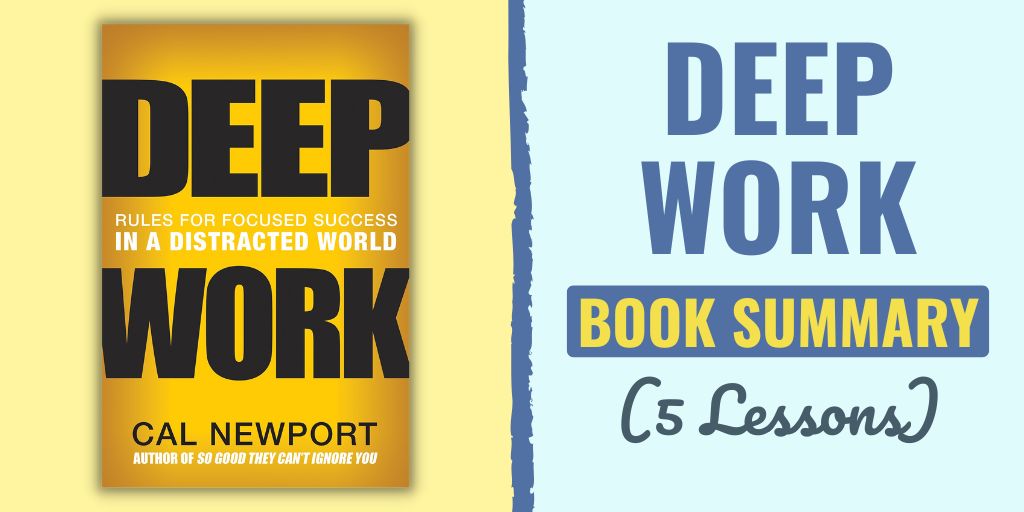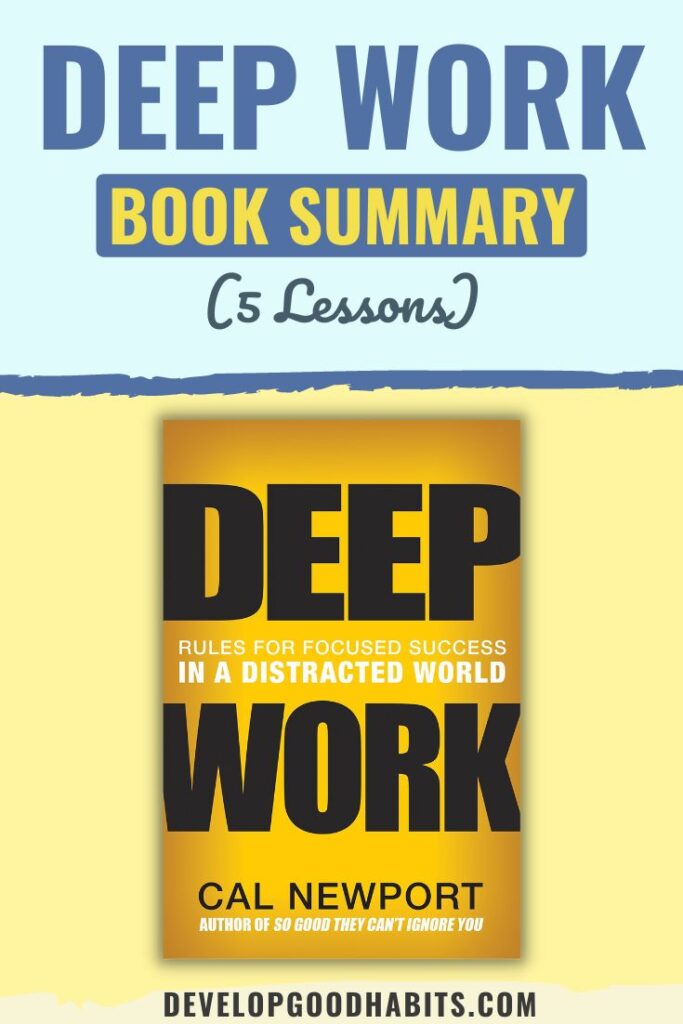Have you ever struggled to focus on a task, only to be constantly interrupted by emails, social media notifications, or other distractions? You’re not alone, 75 percent of Americans believe that technology leads to distraction and procrastination that hurts productivity.
In the age of information overload and constant connectivity, engaging in deep, meaningful work is becoming increasingly difficult. But fear not, Cal Newport's book, “Deep Work: Rules for Focused Success in a Distracted World,” is here to help you navigate this new digital tide of distraction.
In “Deep Work,” Newport emphasizes the importance of developing the ability to focus without distraction on cognitively demanding tasks. He argues that this skill has become a rare and valuable commodity in today's fast-paced, technology-driven world.
Now, if you’d like to check out the book, you can read it on your Kindle, get a print copy, or listen to the audiobook.
In this book review, we’ll delve into 5 lessons you can learn that can either help you gauge if you want to buy the book or act as a study aid if you already have it.
Lesson 1: Understanding Deep Work
Deep Work, as described by Cal Newport, refers to professional activities that are carried out in a state of distraction-free concentration, pushing your cognitive capabilities to their limit.
Engaging in deep work allows you to create new value, improve your skills, and achieve results that are hard for others to replicate. In today's fast-paced, technology-driven world, deep work is a rare and valuable skill.
Mastering deep work can help you set yourself apart and give you the skills you need to tackle any challenge.
A good way to understand deep work is to learn about its opposite – shallow work.
Shallow work encompasses tasks that are non-cognitively demanding and are often performed while you are distracted. These tasks may include:
Shallow work isn’t necessarily bad, but too much of it can throttle your capacity for deep work.
Lesson 2: The Four Rules of Deep Work
In Cal Newport's book “Deep Work,” he introduces four essential rules to help you focus and work more efficiently. These guidelines will enable you to create maximum value and increase your cognitive capabilities.
Rule 1: Work Deeply
To truly excel at a task, you must engage in focused, uninterrupted work. This means eliminating distractions and setting aside dedicated time to immerse yourself in your project. A few strategies to facilitate deep work include:
By cultivating these habits, you will develop a strong foundation for deep work that can greatly increase your productivity.
Rule 2: Embrace Boredom
Learning to accept and even embrace boredom is a key aspect of developing your ability to focus deeply. In today's world of constant stimulation, it's essential to resist the urge to indulge in distractions during periods of downtime. Practice managing your attention by:
Becoming comfortable with boredom allows you to develop your concentration and ability to just “dive in” to challenging work.
Rule 3: Quit Social Media & Eliminate Distractions
Social media is one of the biggest culprits when it comes to time-wasting distractions. While some may argue that it provides necessary networking opportunities, the truth is that it can hurt your ability to focus deeply on your work. Try the following:
By limiting your exposure to social media, you will create an environment more conducive to deep work.
Rule 4: Drain the Shallows
Shallow work consists of tasks that are less cognitively demanding and can often be completed while distracted. To prioritize deep work, you should:
By draining the shallows, you will free up more time for meaningful, deep work that will lead to greater success in your professional life.
In a nutshell, to maximize your productivity and make the most of your time, strive to engage in more deep work sessions. Here are some tips to help you shift your focus toward deep work:
Lesson 3: Implementation – Creating a Schedule
To successfully implement deep work, it's crucial to create a schedule tailored to your needs.
Start by identifying blocks of time in your day when you can work without distractions. This may involve setting aside specific hours or designating days for deep work sessions.
Experiment with different time frames to figure out what works best for you. Once you have determined your ideal schedule, stick to it consistently to build a habit of deep work.
If you’re struggling to find time, start small, just 30 minutes a day. Look at things that you can chop or trim to make room for more deep work.
Lesson 4: Implementation – Choose an Approach
Deep work approaches vary, and finding the right one for you can improve productivity. Cal Newport outlines four different strategies in his book:
- Monastic Approach: This approach involves eliminating or minimizing all shallow work, dedicating your focus solely to deep work. Limit your communication with the outside world and prioritize in-depth tasks.
This is great for people who like to go all in on new techniques or when making changes.
- Bimodal Approach: Split your time between deep work and other responsibilities. For instance, dedicate specific days or weeks entirely to deep tasks while reserving others for shallow work.
This is great if you’re someone who likes variation. Shuffling between deep work and other tasks is a good way to refresh your mind and avoid burnout.
- Rhythmic Approach: Set aside daily time blocks for deep work, creating a consistent rhythm. This approach could entail a couple of hours each morning or afternoon, allowing you to balance deep work with other obligations.
This is great for people who need to plan or organize their day to feel anchored.
- Journalistic Approach: Adapt to work on deep tasks whenever time permits, especially for those with unpredictable schedules. Develop the ability to switch into deep work mode quickly and efficiently.
This is great if you’re extremely busy, as it is essentially asking you to turn your tasks into opportunities for deep work.
Lesson 5: Why Should You Engage in Deep Work? (The Benefits)
Perhaps the most important question is, why should you bother doing deep work? Are there any benefits beyond “setting yourself apart from peers”? The answer is yes!
Deep work offers a buffet of benefits that will support and enhance just about any area of life you’re interested in developing or improving.
Final Thoughts on Deep Work
In Deep Work, Cal Newport emphasizes the importance of developing a distraction-free focus in today's highly connected world. By doing so, you can improve both the quality and speed of your output.
The book offers practical steps to cultivate the ability to work deeply and avoid the pitfalls of shallow tasks, as well as develop the ability to focus and prioritize, which are key skills in our technologically dominated lives.
Now, as a reminder, if you’d like to check out the book, you can read it on your Kindle, get a print copy, or listen to the audiobook.
And if you want more book reviews and similar content, check out these blog posts:
- Who Moved My Cheese Book Summary (5 Lessons)
- The 7-Step Process to Plan Your Week
- The 12 Week Year Book Summary (5 Lessons)
Finally, if you want to level up your productivity and time management skills, then watch this free video about the 9 productivity habits you can build at work.



